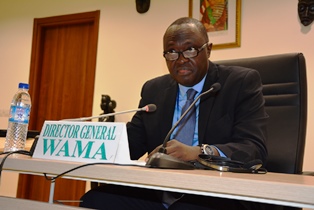 The Director General of the West African Monetary Agency (WAMA), Mr. Momodou B. Saho, says the ongoing ECOWAS conference comes against the backdrop of slowdown in growth momentum in the sub region reflecting developments in the largest economy, Nigeria.
The Director General of the West African Monetary Agency (WAMA), Mr. Momodou B. Saho, says the ongoing ECOWAS conference comes against the backdrop of slowdown in growth momentum in the sub region reflecting developments in the largest economy, Nigeria.
He told delegates attending the ongoing ECOWAS Statutory Meeting in Monrovia Thursday that the ECOWAS economy slowed significantly in 2016 to 0.1 percent after growing by 3.3 percent the previous year.
According to a MFDP release, Mr. Momodou attributed the trend mainly to the effects of falling commodity prices, energy and fuel supply constraints and the deterioration of the security situation in some countries.
“However, many member states continued to register robust growth and overall growth prospects in 2017 are favorable on account of the expected recovery in Nigeria,” he maintained.
On the implementation of progress towards ECOWAS Monetary Cooperation Programme (EMCP), Joint WAMA/WAMI/ECOWAS Commission, multilateral surveillance missions were carried out in April, 2017 to review performance as at the end of December 2016.
Mr. Momodou said the assessment showed that the microeconomic convergence profile deteriorated compared to 2015, “particularly with regard to the criteria on budget deficit, Central Bank financing, inflation, and nominal exchange rate.”
He said only one (two) member states met all the four primary criteria in 2016 compared to four in 2015.
The release further indicated that, the WAMA executive noted that due to the deteriorating performance on the microeconomic convergence front, member states need to strengthen resolve to maintain microeconomic stability and put emphasis on economic diversification and improve business climate.
He believes this will enable them to “unleash the tremendous potential of our region and achieve the objective of the Monetary Cooperation Programme.
Mr. Momodou said “Our broad policy message for these meetings that countries impacted upon by commodity price declines need to move faster to implement reforms that will stem the decline in revenues and external reserves and reduce exchange rate volatility.”
According to him, others countries in the region still experiencing robust growth and low inflation need to use the opportunity to address “emerging vulnerabilities related to widening deficits and higher public debt from position of relative strength.”
 The Director General of the West African Monetary Agency (WAMA), Mr. Momodou B. Saho, says the ongoing ECOWAS conference comes against the backdrop of slowdown in growth momentum in the sub region reflecting developments in the largest economy, Nigeria.
The Director General of the West African Monetary Agency (WAMA), Mr. Momodou B. Saho, says the ongoing ECOWAS conference comes against the backdrop of slowdown in growth momentum in the sub region reflecting developments in the largest economy, Nigeria.